University IPE Assignment: World Economy and Mercantilism
VerifiedAdded on 2022/09/11
|8
|1198
|20
Homework Assignment
AI Summary
This assignment analyzes the international political economy (IPE) based on the provided texts by Balaam and Dillman. It addresses the threats to the post-World War II international order, examining the weakening trends and the role of mercantilism. The assignment explores the evidence of threats to democracy and liberal values in the United States, Europe, and Turkey. It delves into the views of Adam Smith and John Maynard Keynes on the market, state, human nature, and power, comparing their similarities and differences. The assignment also explains the assumptions of classical liberalism. Furthermore, it analyzes the changes in the international economy and security structure that led to neo-mercantilist policies, and explores the mercantilist policies adopted by the United States after World War II and their goals. The analysis provides a comprehensive overview of the key concepts and issues in IPE.
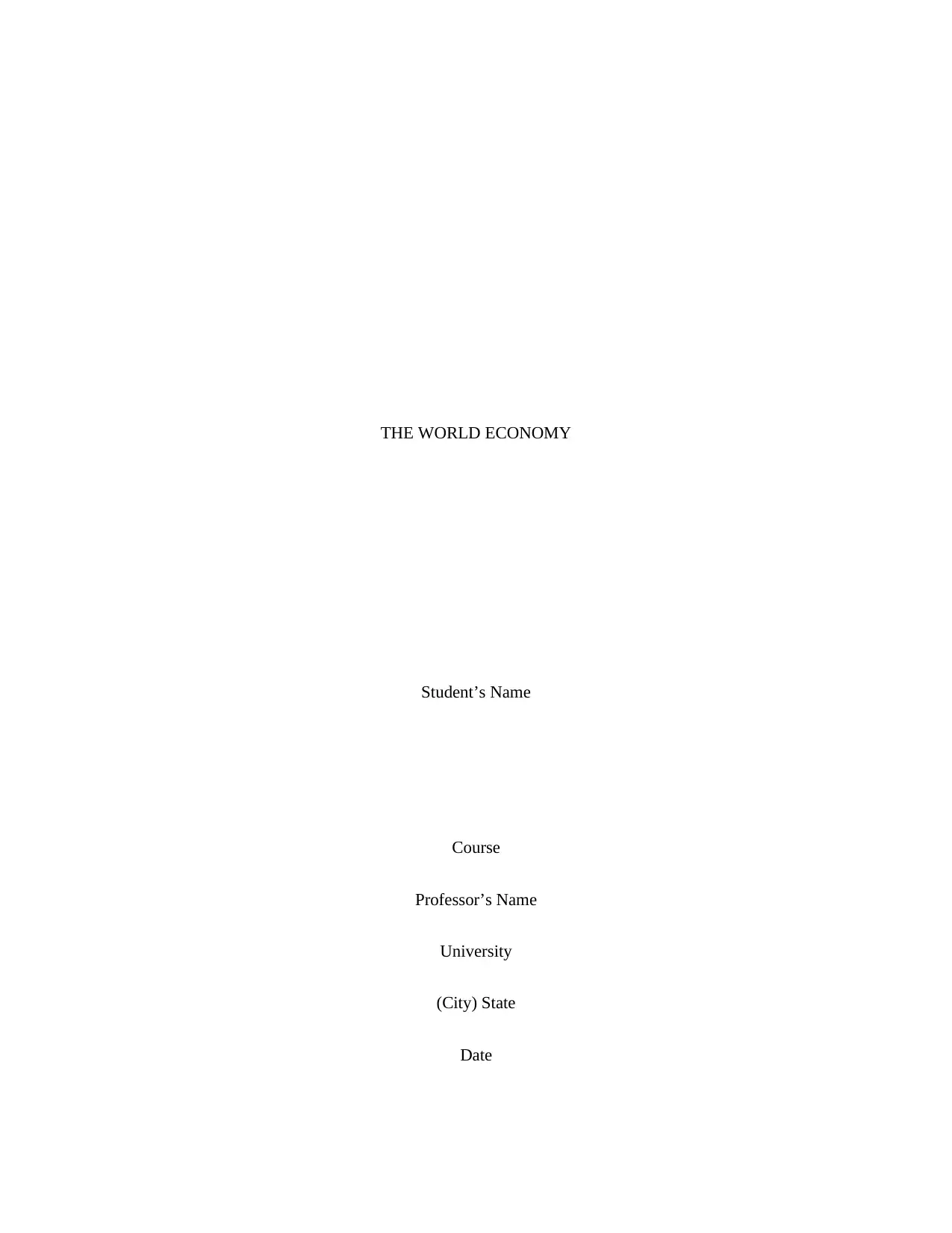
THE WORLD ECONOMY
Student’s Name
Course
Professor’s Name
University
(City) State
Date
Student’s Name
Course
Professor’s Name
University
(City) State
Date
Paraphrase This Document
Need a fresh take? Get an instant paraphrase of this document with our AI Paraphraser
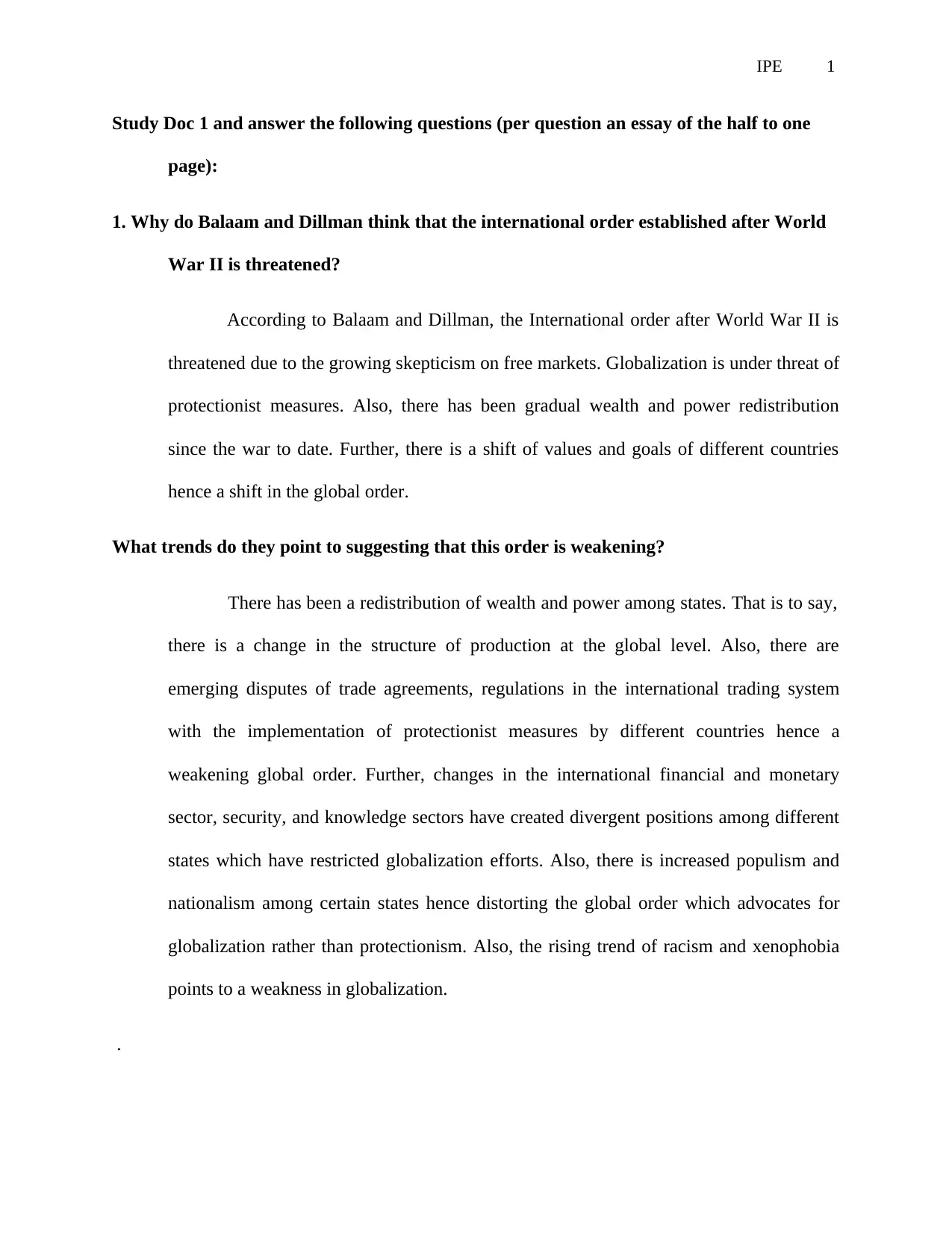
IPE 1
Study Doc 1 and answer the following questions (per question an essay of the half to one
page):
1. Why do Balaam and Dillman think that the international order established after World
War II is threatened?
According to Balaam and Dillman, the International order after World War II is
threatened due to the growing skepticism on free markets. Globalization is under threat of
protectionist measures. Also, there has been gradual wealth and power redistribution
since the war to date. Further, there is a shift of values and goals of different countries
hence a shift in the global order.
What trends do they point to suggesting that this order is weakening?
There has been a redistribution of wealth and power among states. That is to say,
there is a change in the structure of production at the global level. Also, there are
emerging disputes of trade agreements, regulations in the international trading system
with the implementation of protectionist measures by different countries hence a
weakening global order. Further, changes in the international financial and monetary
sector, security, and knowledge sectors have created divergent positions among different
states which have restricted globalization efforts. Also, there is increased populism and
nationalism among certain states hence distorting the global order which advocates for
globalization rather than protectionism. Also, the rising trend of racism and xenophobia
points to a weakness in globalization.
.
Study Doc 1 and answer the following questions (per question an essay of the half to one
page):
1. Why do Balaam and Dillman think that the international order established after World
War II is threatened?
According to Balaam and Dillman, the International order after World War II is
threatened due to the growing skepticism on free markets. Globalization is under threat of
protectionist measures. Also, there has been gradual wealth and power redistribution
since the war to date. Further, there is a shift of values and goals of different countries
hence a shift in the global order.
What trends do they point to suggesting that this order is weakening?
There has been a redistribution of wealth and power among states. That is to say,
there is a change in the structure of production at the global level. Also, there are
emerging disputes of trade agreements, regulations in the international trading system
with the implementation of protectionist measures by different countries hence a
weakening global order. Further, changes in the international financial and monetary
sector, security, and knowledge sectors have created divergent positions among different
states which have restricted globalization efforts. Also, there is increased populism and
nationalism among certain states hence distorting the global order which advocates for
globalization rather than protectionism. Also, the rising trend of racism and xenophobia
points to a weakness in globalization.
.
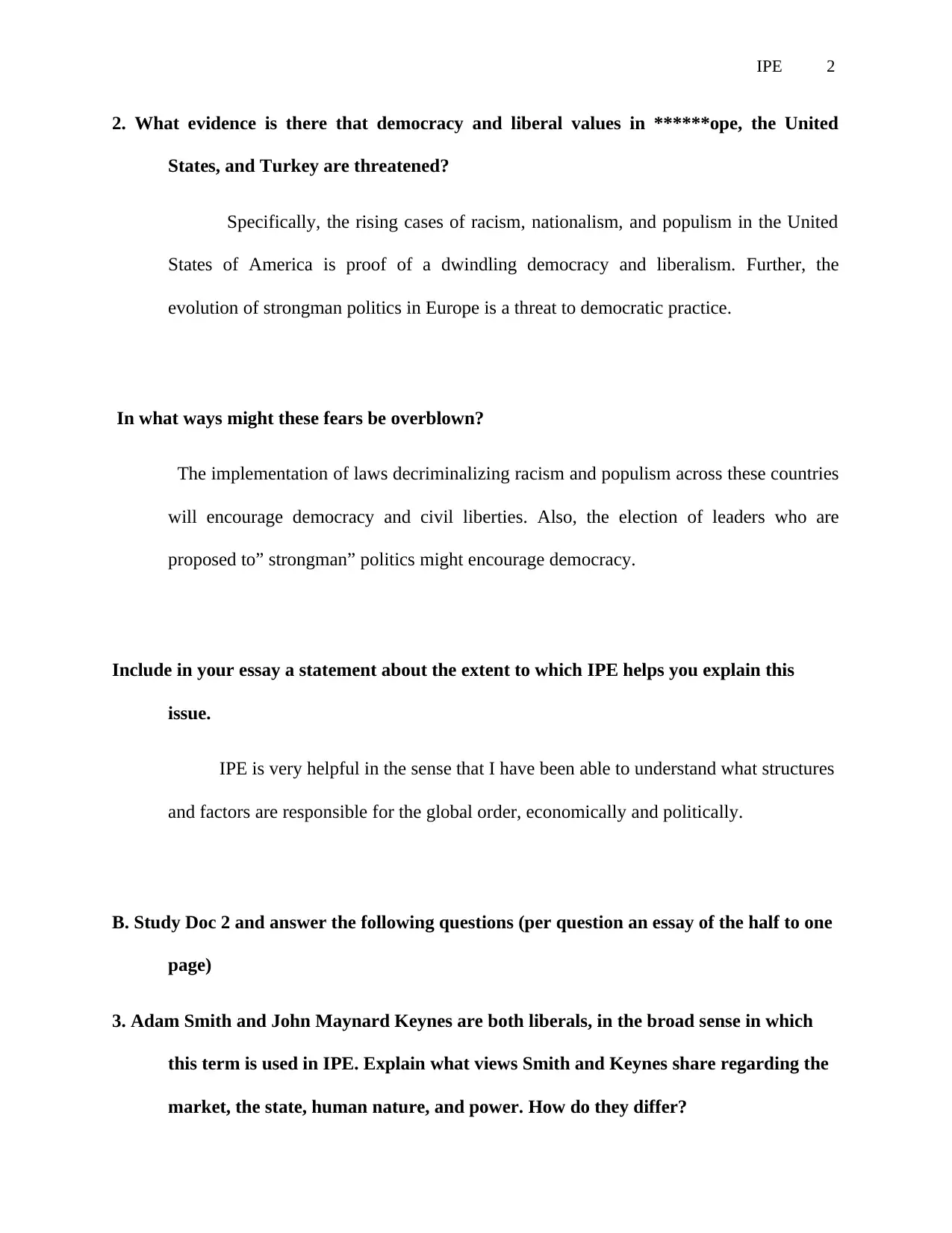
IPE 2
2. What evidence is there that democracy and liberal values in ******ope, the United
States, and Turkey are threatened?
Specifically, the rising cases of racism, nationalism, and populism in the United
States of America is proof of a dwindling democracy and liberalism. Further, the
evolution of strongman politics in Europe is a threat to democratic practice.
In what ways might these fears be overblown?
The implementation of laws decriminalizing racism and populism across these countries
will encourage democracy and civil liberties. Also, the election of leaders who are
proposed to” strongman” politics might encourage democracy.
Include in your essay a statement about the extent to which IPE helps you explain this
issue.
IPE is very helpful in the sense that I have been able to understand what structures
and factors are responsible for the global order, economically and politically.
B. Study Doc 2 and answer the following questions (per question an essay of the half to one
page)
3. Adam Smith and John Maynard Keynes are both liberals, in the broad sense in which
this term is used in IPE. Explain what views Smith and Keynes share regarding the
market, the state, human nature, and power. How do they differ?
2. What evidence is there that democracy and liberal values in ******ope, the United
States, and Turkey are threatened?
Specifically, the rising cases of racism, nationalism, and populism in the United
States of America is proof of a dwindling democracy and liberalism. Further, the
evolution of strongman politics in Europe is a threat to democratic practice.
In what ways might these fears be overblown?
The implementation of laws decriminalizing racism and populism across these countries
will encourage democracy and civil liberties. Also, the election of leaders who are
proposed to” strongman” politics might encourage democracy.
Include in your essay a statement about the extent to which IPE helps you explain this
issue.
IPE is very helpful in the sense that I have been able to understand what structures
and factors are responsible for the global order, economically and politically.
B. Study Doc 2 and answer the following questions (per question an essay of the half to one
page)
3. Adam Smith and John Maynard Keynes are both liberals, in the broad sense in which
this term is used in IPE. Explain what views Smith and Keynes share regarding the
market, the state, human nature, and power. How do they differ?
⊘ This is a preview!⊘
Do you want full access?
Subscribe today to unlock all pages.

Trusted by 1+ million students worldwide
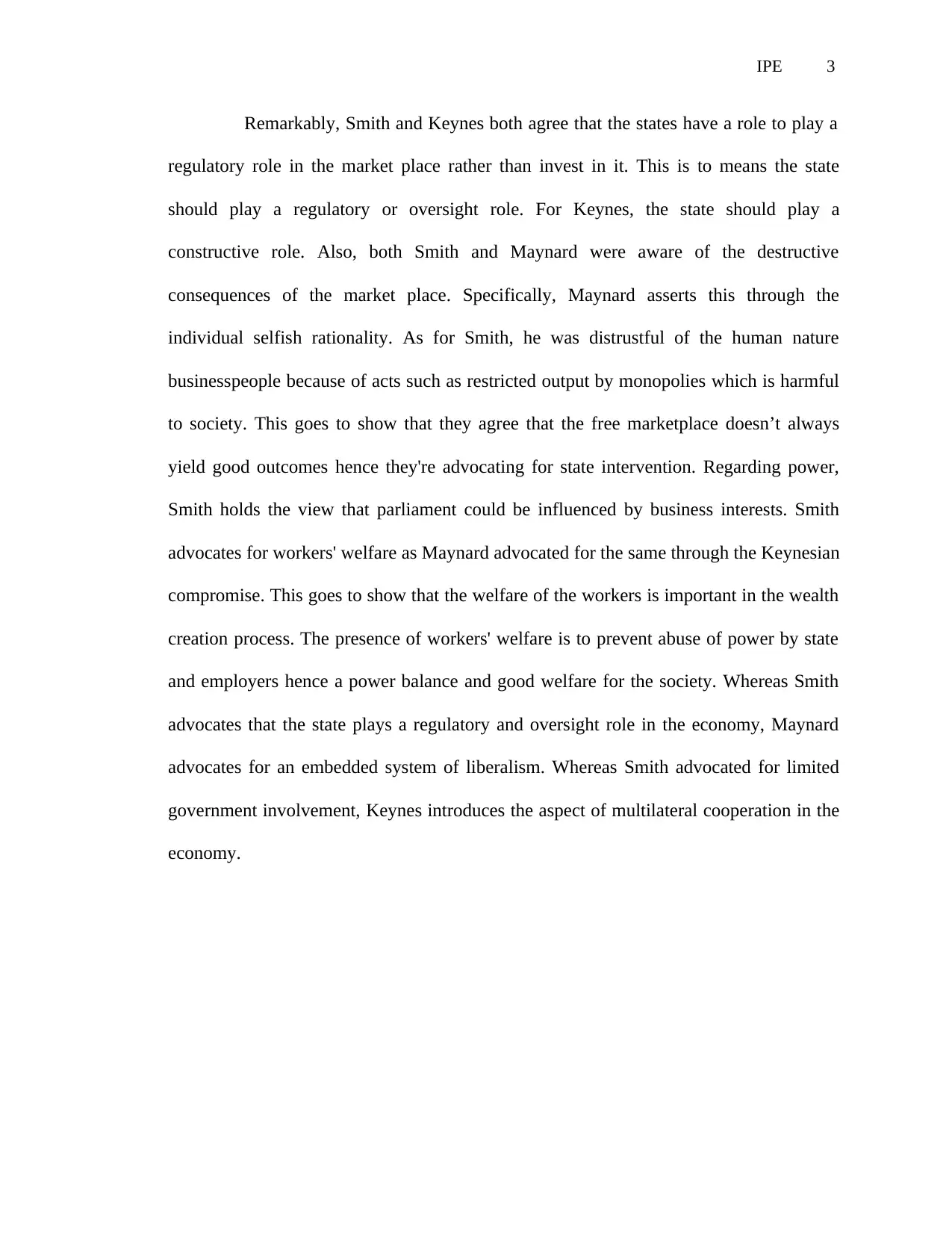
IPE 3
Remarkably, Smith and Keynes both agree that the states have a role to play a
regulatory role in the market place rather than invest in it. This is to means the state
should play a regulatory or oversight role. For Keynes, the state should play a
constructive role. Also, both Smith and Maynard were aware of the destructive
consequences of the market place. Specifically, Maynard asserts this through the
individual selfish rationality. As for Smith, he was distrustful of the human nature
businesspeople because of acts such as restricted output by monopolies which is harmful
to society. This goes to show that they agree that the free marketplace doesn’t always
yield good outcomes hence they're advocating for state intervention. Regarding power,
Smith holds the view that parliament could be influenced by business interests. Smith
advocates for workers' welfare as Maynard advocated for the same through the Keynesian
compromise. This goes to show that the welfare of the workers is important in the wealth
creation process. The presence of workers' welfare is to prevent abuse of power by state
and employers hence a power balance and good welfare for the society. Whereas Smith
advocates that the state plays a regulatory and oversight role in the economy, Maynard
advocates for an embedded system of liberalism. Whereas Smith advocated for limited
government involvement, Keynes introduces the aspect of multilateral cooperation in the
economy.
Remarkably, Smith and Keynes both agree that the states have a role to play a
regulatory role in the market place rather than invest in it. This is to means the state
should play a regulatory or oversight role. For Keynes, the state should play a
constructive role. Also, both Smith and Maynard were aware of the destructive
consequences of the market place. Specifically, Maynard asserts this through the
individual selfish rationality. As for Smith, he was distrustful of the human nature
businesspeople because of acts such as restricted output by monopolies which is harmful
to society. This goes to show that they agree that the free marketplace doesn’t always
yield good outcomes hence they're advocating for state intervention. Regarding power,
Smith holds the view that parliament could be influenced by business interests. Smith
advocates for workers' welfare as Maynard advocated for the same through the Keynesian
compromise. This goes to show that the welfare of the workers is important in the wealth
creation process. The presence of workers' welfare is to prevent abuse of power by state
and employers hence a power balance and good welfare for the society. Whereas Smith
advocates that the state plays a regulatory and oversight role in the economy, Maynard
advocates for an embedded system of liberalism. Whereas Smith advocated for limited
government involvement, Keynes introduces the aspect of multilateral cooperation in the
economy.
Paraphrase This Document
Need a fresh take? Get an instant paraphrase of this document with our AI Paraphraser
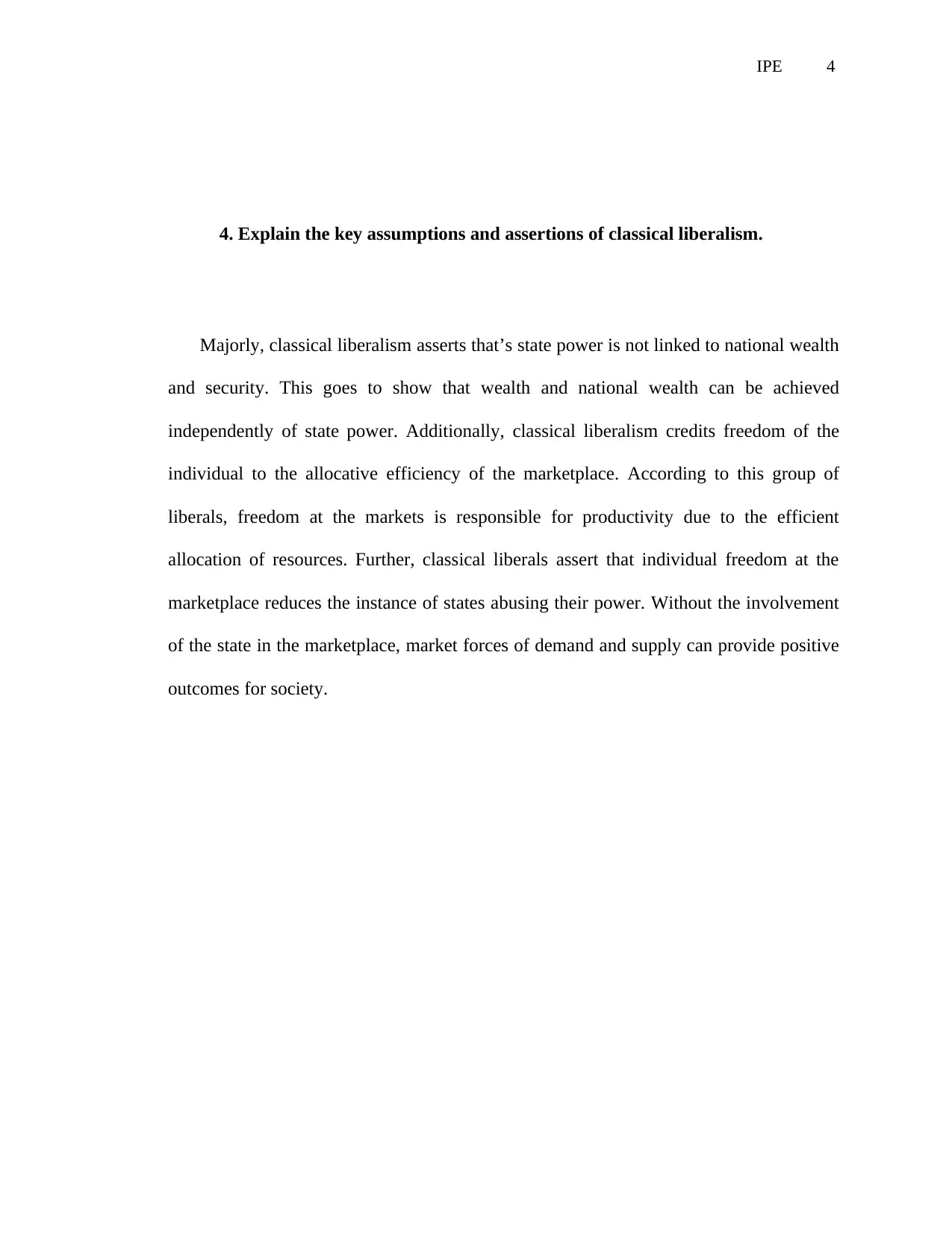
IPE 4
4. Explain the key assumptions and assertions of classical liberalism.
Majorly, classical liberalism asserts that’s state power is not linked to national wealth
and security. This goes to show that wealth and national wealth can be achieved
independently of state power. Additionally, classical liberalism credits freedom of the
individual to the allocative efficiency of the marketplace. According to this group of
liberals, freedom at the markets is responsible for productivity due to the efficient
allocation of resources. Further, classical liberals assert that individual freedom at the
marketplace reduces the instance of states abusing their power. Without the involvement
of the state in the marketplace, market forces of demand and supply can provide positive
outcomes for society.
4. Explain the key assumptions and assertions of classical liberalism.
Majorly, classical liberalism asserts that’s state power is not linked to national wealth
and security. This goes to show that wealth and national wealth can be achieved
independently of state power. Additionally, classical liberalism credits freedom of the
individual to the allocative efficiency of the marketplace. According to this group of
liberals, freedom at the markets is responsible for productivity due to the efficient
allocation of resources. Further, classical liberals assert that individual freedom at the
marketplace reduces the instance of states abusing their power. Without the involvement
of the state in the marketplace, market forces of demand and supply can provide positive
outcomes for society.
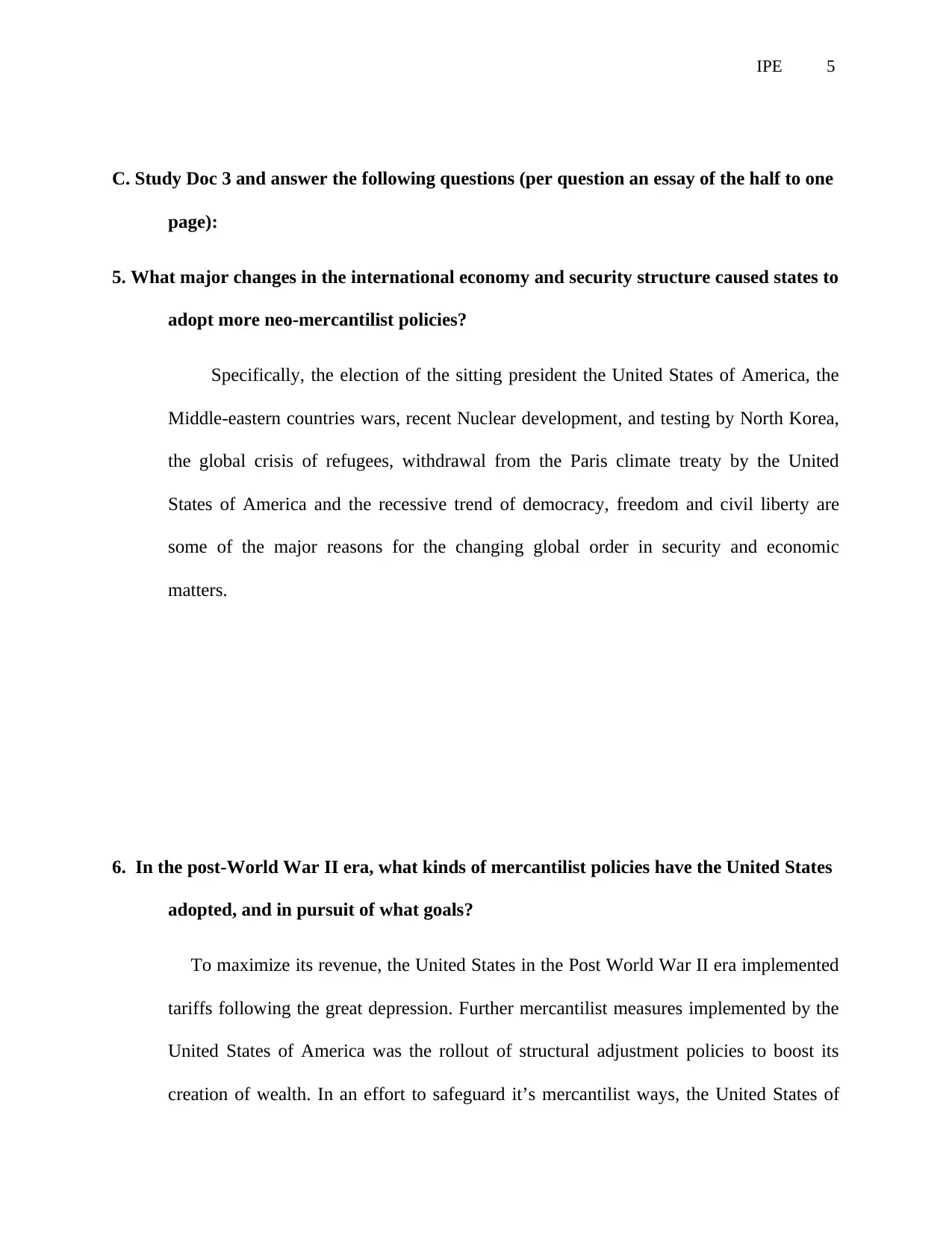
IPE 5
C. Study Doc 3 and answer the following questions (per question an essay of the half to one
page):
5. What major changes in the international economy and security structure caused states to
adopt more neo-mercantilist policies?
Specifically, the election of the sitting president the United States of America, the
Middle-eastern countries wars, recent Nuclear development, and testing by North Korea,
the global crisis of refugees, withdrawal from the Paris climate treaty by the United
States of America and the recessive trend of democracy, freedom and civil liberty are
some of the major reasons for the changing global order in security and economic
matters.
6. In the post-World War II era, what kinds of mercantilist policies have the United States
adopted, and in pursuit of what goals?
To maximize its revenue, the United States in the Post World War II era implemented
tariffs following the great depression. Further mercantilist measures implemented by the
United States of America was the rollout of structural adjustment policies to boost its
creation of wealth. In an effort to safeguard it’s mercantilist ways, the United States of
C. Study Doc 3 and answer the following questions (per question an essay of the half to one
page):
5. What major changes in the international economy and security structure caused states to
adopt more neo-mercantilist policies?
Specifically, the election of the sitting president the United States of America, the
Middle-eastern countries wars, recent Nuclear development, and testing by North Korea,
the global crisis of refugees, withdrawal from the Paris climate treaty by the United
States of America and the recessive trend of democracy, freedom and civil liberty are
some of the major reasons for the changing global order in security and economic
matters.
6. In the post-World War II era, what kinds of mercantilist policies have the United States
adopted, and in pursuit of what goals?
To maximize its revenue, the United States in the Post World War II era implemented
tariffs following the great depression. Further mercantilist measures implemented by the
United States of America was the rollout of structural adjustment policies to boost its
creation of wealth. In an effort to safeguard it’s mercantilist ways, the United States of
⊘ This is a preview!⊘
Do you want full access?
Subscribe today to unlock all pages.

Trusted by 1+ million students worldwide
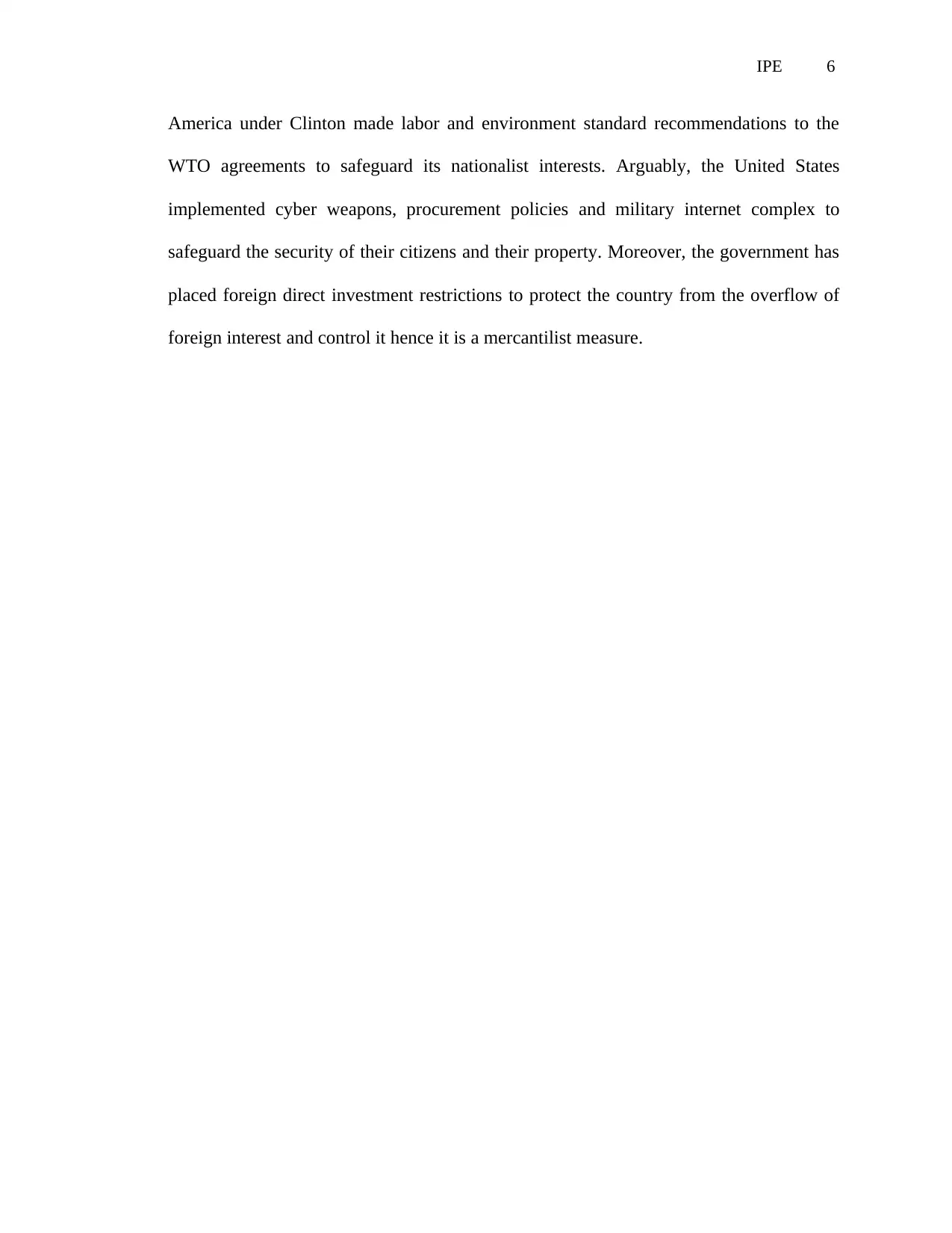
IPE 6
America under Clinton made labor and environment standard recommendations to the
WTO agreements to safeguard its nationalist interests. Arguably, the United States
implemented cyber weapons, procurement policies and military internet complex to
safeguard the security of their citizens and their property. Moreover, the government has
placed foreign direct investment restrictions to protect the country from the overflow of
foreign interest and control it hence it is a mercantilist measure.
America under Clinton made labor and environment standard recommendations to the
WTO agreements to safeguard its nationalist interests. Arguably, the United States
implemented cyber weapons, procurement policies and military internet complex to
safeguard the security of their citizens and their property. Moreover, the government has
placed foreign direct investment restrictions to protect the country from the overflow of
foreign interest and control it hence it is a mercantilist measure.
Paraphrase This Document
Need a fresh take? Get an instant paraphrase of this document with our AI Paraphraser
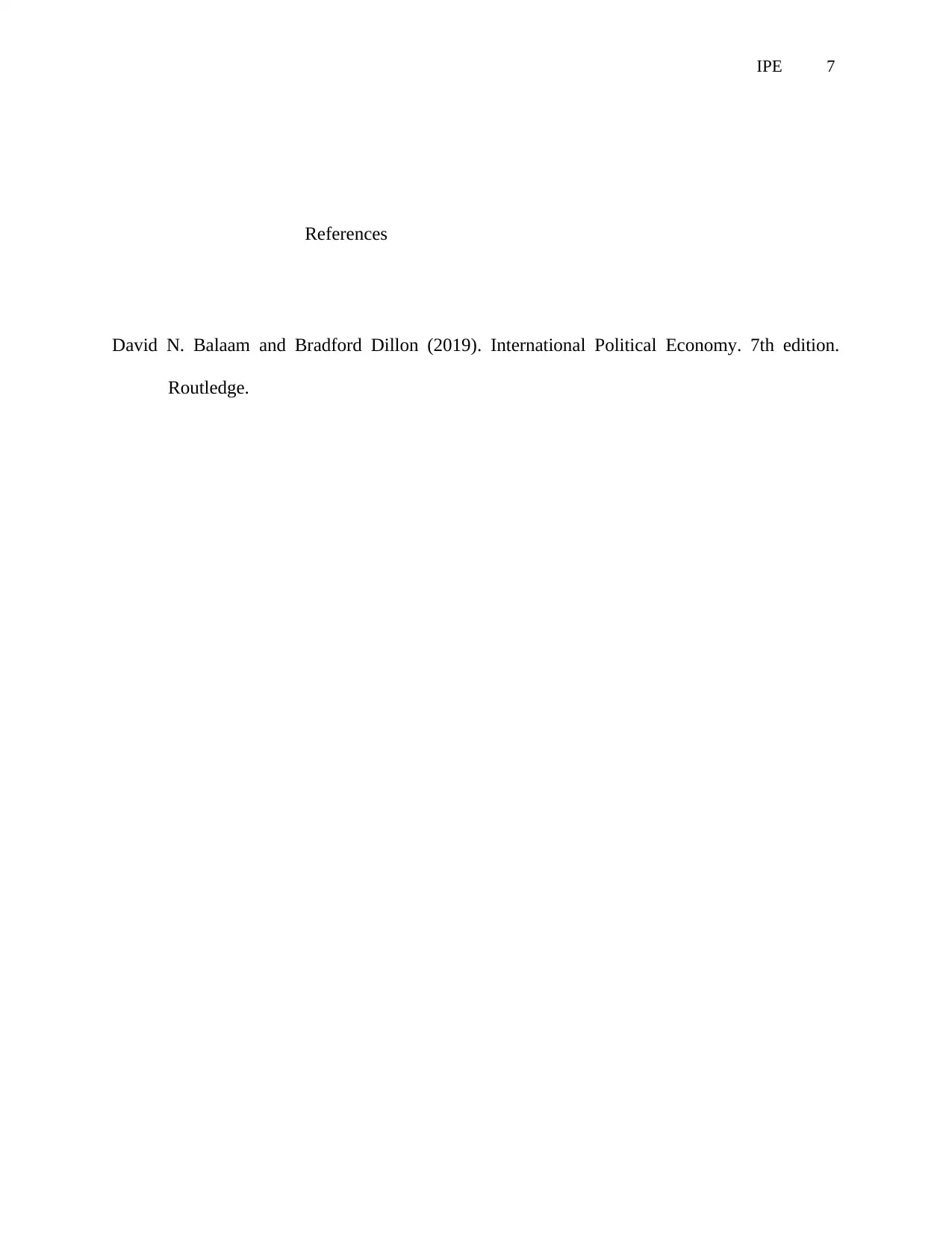
IPE 7
References
David N. Balaam and Bradford Dillon (2019). International Political Economy. 7th edition.
Routledge.
References
David N. Balaam and Bradford Dillon (2019). International Political Economy. 7th edition.
Routledge.
1 out of 8
Your All-in-One AI-Powered Toolkit for Academic Success.
+13062052269
info@desklib.com
Available 24*7 on WhatsApp / Email
![[object Object]](/_next/static/media/star-bottom.7253800d.svg)
Unlock your academic potential
Copyright © 2020–2026 A2Z Services. All Rights Reserved. Developed and managed by ZUCOL.